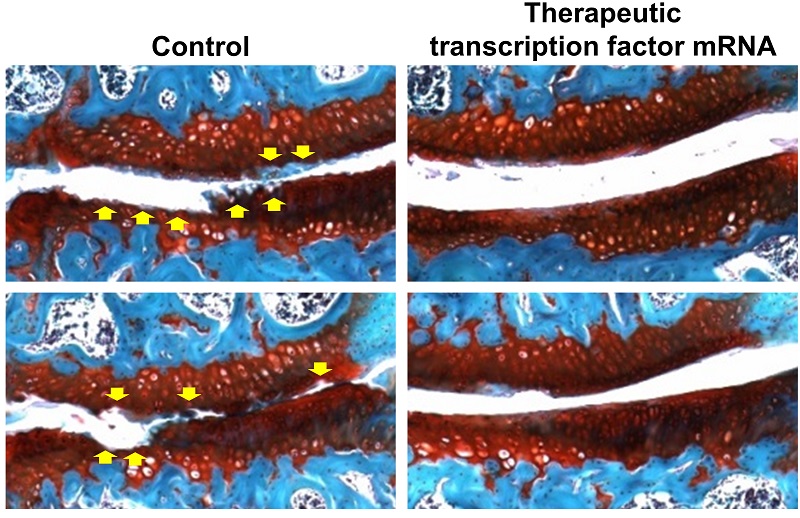Effective osteoarthritis therapy with nucleic acid medicine In-joint therapy with mRNA of a transcription factor for cartilage formation


Suppression of osteoarthritis progression by in-joint delivery of transcription factor mRNA that promotes cartilage formation
Articular cartilage is stained in red. Curling, degeneration and abrasion of the articular cartilage surface (yellow arrows) are suppressed in the therapeutic transcription factor RUNX1 mRNA-injected group compared with the control group.
© 2016 Hailati Aini.
Researchers at the University of Tokyo have demonstrated that in-joint delivery of a transcription factor messenger RNA (mRNA) required for cartilage formation suppresses the progression of osteoarthritis in an animal model. This result suggests that transcription factor mRNAs can function as a novel nucleic acid therapy that specifically regulates transcription of therapeutic genes, supporting its use as an efficient treatment of musculoskeletal degenerative diseases and will advance the development of curative treatments or tissue regenerative therapies for such diseases.
Cartilage in our joints (articular cartilage) plays a key role in our locomotion throughout our lives. Degeneration or damage of the articular cartilage arises from a variety of causes, resulting in osteoarthritis (OA). In the current aging societies, OA is one of the major diseases threatening the quality of life of the elderly and shortening their healthy life expectancies. However, no curative treatment has been developed yet for OA.
In the current study, Project Researcher Hailati Aini, Project Associate Professor Shinsuke Ohba and Professor Ung-il Chung at the University of Tokyo Graduate School of Engineering, together with Project Associate Professor Keiji Itaka and Professor Kazunori Kataoka at the University of Tokyo Graduate School of Medicine, used a polyplex nanomicelle-based mRNA delivery system, developed in previous studies by the research group, to inject mRNA of the transcription factor RUNX1, which supports cartilage formation, into knee joints of OA model mice (mice that are surgically engineered to develop OA) once every three days for a month. OA was significantly suppressed in the RUNX1 mRNA-injected group compared with the control group. In addition, augmented expression of type II collagen (a major cartilage matrix protein), SOX9 (a transcription factor necessary for cartilage formation) and a protein that increases when cells are proliferating (PCNA, proliferating cell nuclear antigen) were observed in the articular cartilage of the RUNX1 mRNA-injected group.
“These results suggest that the mRNA delivered to the joint is translated to produce the RUNX1 protein, which acts as a therapeutic transcription factor, regulates the expression of a set of genes involved in the maintenance and proliferation of cartilage cells,” says Project Associate Professor Ohba. He continues, “This result should find applications in curative treatments or tissue regenerative therapies for a variety of musculoskeletal degenerative diseases.
This work was published in the online version of the British journal Scientific Reports on January 5th, 2016.
Paper
, "Messenger RNA delivery of a cartilage-anabolic transcription factor as a disease-modifying strategy for osteoarthritis treatment", Scientific Reports Online Edition: 2016/01/05 (Japan time), doi: 10.1038/srep18743.
Article link (Publication)
Links
Graduate School of Engineering
Department of Bioengineering, Graduate School of Engineering
Ohba-Tei/Chung Lab, Department of Bioengineering, Graduate School of Engineering
Kataoka Lab, Department of Materials Engineering, Graduate School of Engineering






